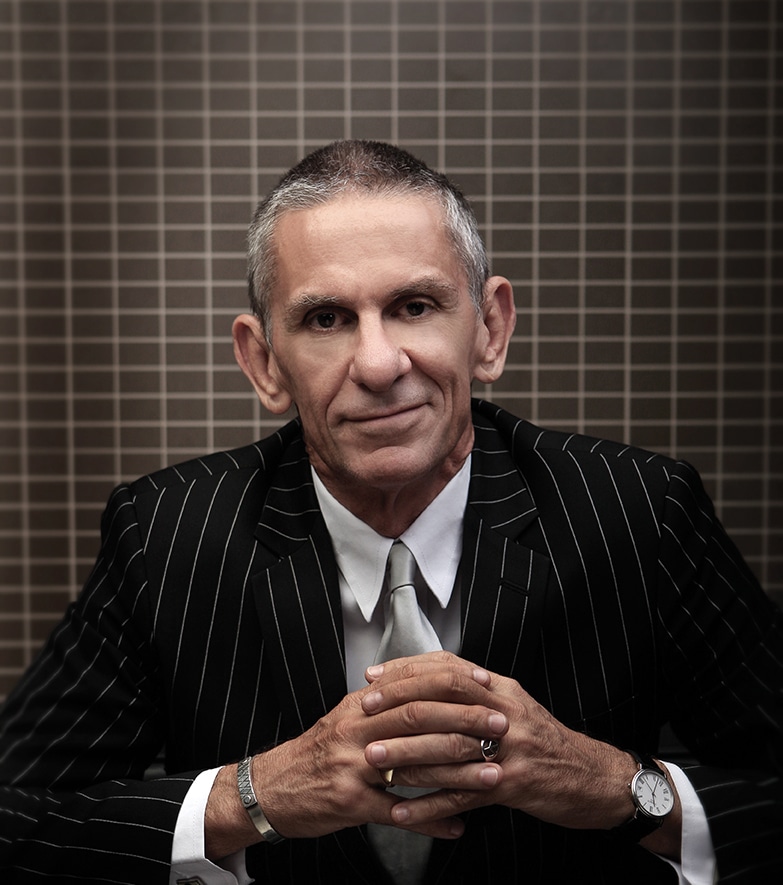PEOPLE
HOMO HUBRIS

WORDS: Chris Nyst PHOTOGRAPHY Brian Usher - www.usherusher.com
The idea that ‘someone upstairs’ is benevolently watching over us, guiding the Fates to ensure we always come out on top, is a comforting thought.
THE Oscar-winning 1956 drama, Somebody Up The Likes Me, launched the career of one of Hollywood’s greatest stars, the brooding, anti-hero heartthrob Paul Newman.
In the highly-acclaimed biopic, Newman played legendary New York City brawler and middleweight boxing champion Rocky Graciano. A poor, disadvantaged kid from a tough neighbourhood, Graciano was raised on the mean streets of Manhattan’s East Side and spent years in reform school, gaol and military prison before fighting his way, tooth and nail, to the top, eventually becoming the World Middleweight Champion in 1947.
In the film of his life, at one point Rocky’s ever-loving sweetheart, Norma, played by Pier Angeli, looks starry-eyed at her brave, battered beau and marvels at all he’s achieved. To which Rocky just shrugs nonchalantly and quips: “You know, I been lucky. Somebody up there likes me.”
Anyone who knows Rocky’s back story might think nothing could be further from the truth. But it’s still a nice movie moment. And a nice sentiment, too.
The idea that ‘someone upstairs’ is benevolently watching over us, guiding the Fates to ensure we always come out on top, is no doubt a comforting thought. But it raises the question – if someone was smiling down on Rocky, who the heck was looking after the poor slob he KO’ed in the sixth to take the World Title? And, for that matter, who was looking after Rocky himself 12 months later when the same guy, Tony Zale, took the title back off him in a re-match, knocking the champ out in the third?
No, I doubt a tough guy like Rocky would really believe anyone gets given more than what they earn fair and square, by blood, sweat and tears.
When I was just a kid, there was an irreverent little tale that did the rounds of the schoolyard, about a Biblical-type figure called Ralph. In the story, Ralph tends a modest crop and works diligently, year in and year out, year after year, to produce a meagre harvest for his poor family. Then, one year, a devastating storm rips through the land and completely wipes out his work.
But Ralph doesn’t despair. Being a pious man, he simply drops to his knees and prays to the heavens, saying: “Lord, Thou hath taken everything from me, destroyed all my work. But I understand. I know this is but a test of my faith. Thou knowest all and Thou workest in strange ways. Thy will be done.”
And, with that, Ralph gets to his feet, till in hand, and starts over again.
A year later, a terrible fire ravages the land and again, Ralph’s humble little crop is completely decimated. But again, Ralph takes it all on the chin. He drops to his knees and declares ‘Thy will be done’, then gets up and starts again.
Months later, when his work is finally finished, the new year brings a whole new disaster – a voluminous flood that completely washes out all of the plants he has grown. Finally, Ralph has had enough. He can no longer accept such shabby treatment. So this time, he doesn’t drop to his knees. He looks up to the sky, defiantly, and rages: “Why? Why Lord? Why? I have withstood all your tests. I have never questioned your will? Why would you do this to me yet again.”
Suddenly, ominously, the clouds open up and a loud, rumbling voice casually replies: “I don’t know, Ralph. But there’s something about you that shits me.”
Even as a schoolboy all those years ago, that small, some may say not-very-funny, and certainly slightly irreverent punch line really tickled me. It seemed a naughty reflection on the randomness of our universe, an almost Douglas Adams-style observation of the absurdity of our universal sense of self-importance. God was on our side, of course. But, to the extent somebody up there maybe liked us, wasn’t it equally possible they didn’t, or at least maybe just not as much as they might, perhaps even for reasons they couldn’t quite put their finger on?
A few years back, I read Israeli professor, philosopher and best-selling author Yuval Noah Harari’s thought-provoking 2017 book, Homo Deus: A Brief History of Tomorrow. In it, Professor Harari introduces the concept of Homo Deus (from the Latin ‘homo’, meaning ‘man’, and ‘Deus’, meaning ‘god’), arguing that modern homo-sapiens, having now conquered the ravages of history, over the next century or so will evolve to become the self-made gods of planet Earth.
In his opening chapter, the author argues that humankind has all but eliminated the three cataclysmic scourges that have dominated our existence for millennia – namely, pandemic, war and famine. He presents impressive statistics and convincing argument to support the view modern medicine has advanced to the point where disease could never again have the debilitating global effect of past plagues, war for territory simply no longer makes sense, and is, therefore, a thing of the past, and modern globalism ensures widespread famine is just no longer a thing.
Then along came the Covid pandemic of 2020, the increasingly crippling effects of global warming and the Russian invasion of Ukraine in 2022. The last I heard of Professor Harari, he was doing a TED talk entitled The War in Ukraine Could Change Everything.
Looks like maybe, for all our high-minded hubris, we’re going to just have to hope, for a little while longer at least, that somebody up there likes us, after all.

Chris Nyst








